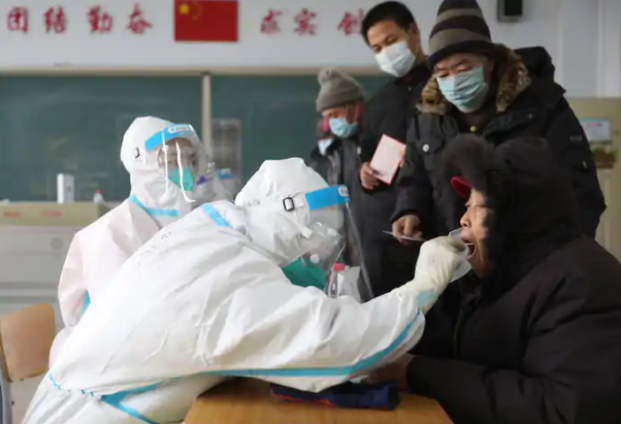
Audio By Carbonatix
Months-long lockdowns. Entire city populations herded through the streets for mandatory testing. The people of China could be forgiven for thinking they had seen it all during the coronavirus pandemic.
But now they face a new indignity: the addition of anal swabs — yes, you read that right — to the testing regimen for those in quarantine.
Chinese state media outlets introduced the new protocol in recent days, prompting widespread discussion and some outrage. Some Chinese doctors say the science is there.
Recovering patients, they say, have continued to test positive through samples from the lower digestive tract days after nasal and throat swabs came back negative.
Yet for many, it seemed a step too far in government intrusions after a year and counting of a dignity-eroding pandemic.
“Everyone involved will be so embarrassed,” one user in Guangdong province said Wednesday on Weibo, a Chinese social media platform. In a Weibo poll, 80 percent of respondents said they “could not accept” the invasive method.
Even Chinese doctors who support the new tests said the method’s inconvenience meant it made sense for use only in select groups, such as at quarantine centers.
“If we add anal swab testing, it can raise our rate of identifying infected patients,” Li Tongzeng, an infectious-disease specialist at Beijing You’an Hospital, said on state-run broadcaster CCTV on Sunday. “But of course, considering that collecting anal swabs is not as convenient as throat swabs, at the moment only key groups such as those in quarantine receive both.”
The new protocol comes just over a year after the virus began spreading rapidly in the country.
Chinese officials are worried about the approach of Lunar New Year next month, often called the world’s largest annual migration. Some 3 billion trips are made over the holiday during a non-pandemic year, which means even a single silent coronavirus case could rapidly leapfrog across the nation.
China is seeking to vaccinate 50 million people before the holiday, but that’s less than 4 percent of its population, far too low a rate to prevent mass transmission.
Officials have tightened restrictions in recent weeks, with tens of millions of people returned to lockdown in areas with isolated outbreaks. As before, travelers arriving from overseas go straight into two weeks of hotel quarantine — but now a week of home quarantine has been added, as well as a week of daily reports to health officials.
Since the beginning of the pandemic, China has been willing to take draconian measures to halt the spread of the coronavirus, even at enormous inconvenience to its population.
In the early days of lockdowns, health officials sometimes sealed apartment buildings to keep people from leaving. Millions were rounded up for overnight flash-testing drives, with people forming lines in the streets in darkness.
After an outbreak at Shanghai’s international airport in November, officials locked thousands of employees inside for testing, prompting a terrifying stampede.
Now, with infections stubbornly continuing to emerge ahead of the holiday, the government has approved an expanded use of anal swab testing.
China tried the testing procedure in small groups last year, with the results circulated in research journals.
A group of Chinese researchers published a study in the Future Microbiology journal in August reporting that for some recovering coronavirus patients, anal swab samples still tested positive after they had tested negative through throat swabs.
“Intriguingly, SARS-CoV-2 detection was positive in the anal swab of two patients and negative in throat swab and sputum samples,” they wrote. “We propose anal swabs as the potentially optimal specimen for SARS-CoV-2 detection for evaluation of hospital discharge of covid-19 patients.”
As for how the test is conducted, the Chinese Center for Disease Control and Prevention published instructions last March. It said that a stool sample should be taken from patients, and if that is not possible, to do an anal swab by inserting a cotton-tipped stick three to five centimeters (one to two inches) into the rectum.
In recent days, the state-run tabloid Global Times noted that the procedure was controversial, with some doctors saying nasal and throat swabs were more effective because coronavirus is a respiratory infection.
“There have been cases concerning the coronavirus testing positive in a patient’s excrement, but no evidence has suggested it had been transmitted through one’s digestive system,” the Global Times cited Yang Zhanqiu, a pathologist at Wuhan University, as saying.
Chinese social media was awash with comments of disbelief and concern about the new test procedure.
“It’s difficult for the nurses,” said one person on Weibo.
“We must really try hard to avoid catching coronavirus!!” said another.
Latest Stories
-
Adom FM’s ‘Strictly Highlife’ lights up La Palm with rhythm and nostalgia in unforgettable experience
2 hours -
Ghana is rising again – Mahama declares
5 hours -
Firefighters subdue blaze at Accra’s Tudu, officials warn of busy fire season ahead
6 hours -
Luv FM’s Family Party In The Park ends in grand style at Rattray park
6 hours -
Mahama targets digital schools, universal healthcare, and food self-sufficiency in 2026
6 hours -
Ghana’s global image boosted by our world-acclaimed reset agenda – Mahama
6 hours -
Full text: Mahama’s New Year message to the nation
6 hours -
The foundation is laid; now we accelerate and expand in 2026 – Mahama
7 hours -
There is no NPP, CPP nor NDC Ghana, only one Ghana – Mahama
7 hours -
Eduwatch praises education financing gains but warns delays, teacher gaps could derail reforms
7 hours -
Kusaal Wikimedians take local language online in 14-day digital campaign
8 hours -
Stop interfering in each other’s roles – Bole-Bamboi MP appeals to traditional rulers for peace
8 hours -
Playback: President Mahama addresses the nation in New Year message
9 hours -
Industrial and Commercial Workers’ Union call for strong work ethics, economic participation in 2026 new year message
10 hours -
Crossover Joy: Churches in Ghana welcome 2026 with fire and faith
11 hours

